Our Heart Heroes
In celebration of American Heart Month, the Cardiac Center at Children’s Hospital of Philadelphia (CHOP) invites you to meet a few of our favorite heart heroes — past patients sharing their experience and words of wisdom to support current cardiac kids and families.
Marissa, 26
Diagnosis: Pulmonary atresia, congenitally corrected transposition of the great arteries (CC-TGA or L-TGA), ventricular septal defect, dextrocardia and bilateral superior vena cavas
Q: What helped you the most when you were going through treatment for your cardiac condition?
A: I had my last surgery at 22 months old, and did not need another intervention until I was 18. I had no memory of my childhood procedures, so I was very nervous when undergoing my first procedure in adulthood (and subsequent procedures as well). When I’m in the waiting room, I enjoy listening to music and reading books, two hobbies that allow me a short distraction before a potentially stressful appointment.
I’ve found that leaning on my support system – friends, family and fiancé – has been the most helpful. I’m a member of several online congenital heart disease (CHD) patient support groups, so I can hear the experience of patients like me who have been in similar situations. The Adult Congenital Heart Association has given me the chance to connect with others around the world who have CHD!
Q: What is your life like now?
A: Although my CHD has been stable, I still follow up with my adult congenital heart disease specialist every 6 months. These appointments can include echocardiograms, electrocardiograms, exercise stress tests, cardiac MRIs, and more. I also see the liver specialist and other specialists to treat sequelae (other conditions that arose) from my heart condition. For me, this is all normal. My fiancé now comes to most of my cardiology appointments, and it’s great to have him as my support person.
Despite my lifelong CHD diagnosis, I’m grateful for my life and for those I share it with. I recently graduated with my master’s degree, which allows me to work in my dream job as a clinical nurse specialist (fellow) who cares for patients with congenital heart defects, like me! I’m in the final stages of planning my wedding, a milestone my parents weren’t sure they’d ever see while I was in the midst of three major heart surgeries as a baby. And I have two cats who bring happiness (and laughter) to our home every day.
Q: What’s the most important piece of advice you have for other kids who are currently in the midst of treatment for a cardiac condition?
A: Follow your heart – no pun intended! With the support and care of my cardiologist, I never let congenital heart disease define me. Sure, it’s a big piece of my life, but it’s not the sum total of my entire life. Without following my heart, I don’t believe I’d be where I am today. One of my favorite quotes comes from “Dear Evan Hansen,” a musical. “All you gotta do is just believe you can be who you want to be.” I try to live this quote each day, and continue to surprise myself with what I’ve achieved.
Q: Why do you think it’s important to share your success story?
A: With a scary, sometimes uncertain diagnosis such as CHD, it is critical to offer hope and guidance. When I was young, my parents didn’t have the opportunity to meet or hear from others who had CHD. So they never had a solid sense of what my future would look like. I strive to break through this barrier, so that other CHD patients, and the parents of those kids, can see what potential the future has. Every CHD patient is different, but we all go through similar experiences, and we understand each other better than anyone else can. The greater CHD community has helped me grow into the person I am today. By sharing my story, I hope to do the same for those kids who are growing up now.
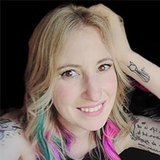
MarlaJan (“MJ”), 40
Diagnosis: Tetralogy of Fallot
Q: What helped you most when you were going through treatment for your cardiac condition?
A: Things that helped me include deep, soothing breathing, and also distraction techniques, like watching a video or looking at the phone.
Q: What is your life like now?
A: I’m newly married and I have four stepchildren. I now work in the Cardiac Center Referral Office. I am also a professional patient advocate: I travel all over the country and speak about my medical experiences at conferences, advocating for improved care.
Q: What’s the most important piece of advice you have for children who are currently in the midst of treatment for a cardiac condition?
A: Talk about it — It’s okay to talk about your fears and anxieties and ask questions. Support for your mental health is a tremendously important part of medical care.
Q: Why do you think it’s important to share your success story?
A: If just one person reads this and knows they are not alone, that’s success. You never know who’s going to stumble upon your story and read it. If it helps them, that’s a win.
Read more about MarlaJan's story.

Sasha, 19
Diagnosis: Tetralogy of Fallot
Q: What is your life like now?
A: I am a college student majoring in journalism and media studies. I love research, and I’ve written for a lot of independent magazines. If I’m not doing yoga or writing, I’m probably trying on clothes. There are so many amazing thrift stores in New York, and I love thrifting! I also love spending time with my family and friends.
Q: What is the most important piece of advice you have for kids who are currently in the midst of treatment for a cardiac condition?
A: Don’t be ashamed of any scars you have and don’t try to hide them. Your scars are part of who you are. They show that you survived.
Q: Why do you think it’s important to share your success story?
A: Our success stories give other people hope. Patient success stories meant a lot to my mom when she was pregnant with me and knew I had CHD. They kept her going. Positive stories can help keep your spirits up for any treatment you may experience.
Read more about Sasha's story.
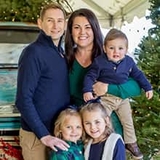
Patrick, 35
Diagnosis: Tetralogy of Fallot
Q: What helped you the most when you were going through treatment for your cardiac condition?
A: The two most important things were my will to fight for my life and my family’s and support group’s will to fight alongside me. Their support helps me know I am not alone in this fight.
Q: What is your life like now?
A: I am married with three beautiful children, and I work as a high school counselor while also coaching basketball and baseball. My children are all followed by CHOP’s Cardiac Center for familial cardiomyopathy. Seeing CHOP both as a patient and as a parent, I know we are truly blessed to live so close to this amazing hospital.
Q: What’s the most important piece of advice you have for other kids who are currently in the midst of treatment for a cardiac condition?
A: A strong support group and knowing that you are not the only person going through this is paramount to a patient’s ability to recover both physically and mentally.
Q: Why do you think it’s important to share your success story?
A: I want to let others know there is someone else out there just like them. If my story can help one person get through this difficult experience, then I feel as though I’ve been able to give back, in a small way, to those who helped me get through my most difficult times.
Read more about Patrick's story.
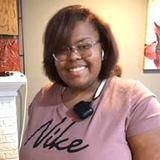
Cherish, 16
Diagnosis: Dilated cardiomyopathy and heart transplant
Q: What helped you the most when you were going through treatment for your cardiac condition?
A: CHOP’s Child life team helped me through a lot of obstacles while I was there.
Q: What is your life like now?
A: My life has calmed down a lot, and I’m getting used to my “new normal.”
Q: What’s the most important piece of advice you have for other kids who are currently in the midst of treatment for a cardiac condition?
A: Your mindset can make a world of difference! Having a positive outlook in a negative situation is really hard but extremely helpful. You can’t control much when in the hospital, but you can decide how you view your situation.
Q: Why do you think it’s important to share your success story?
A: When you're in a bad situation, seeing others that have been where you are and seeing how far they have come can be the push that helps you get through it.
Read more about Cherish's story.

Maeve, 17
Diagnosis: Sudden cardiac arrest
Q: What helped you the most when you were going through treatment for your cardiac condition?
A: From my surgeon to the child life specialists to the people that cleaned my room, everyone was always there to have a genuine conversation. They were always open to answer my questions and talk to me about my situation, including life outside the hospital.
Q: What is your life like now?
A: I love my family and friends. At school, I am in the school play, on the softball team and in the community service group. I am hoping to become a nurse after college. The nurses at CHOP really inspired me.
Q: What’s the most important piece of advice you have for other kids who are currently in the midst of treatment for a cardiac condition?
A: Believe in yourself, and you can get through whatever life throws at you. It is not always easy, but lean on your friends, family or even people you meet at CHOP when you're feeling anything negative. That’s what they are there for!
Q: Why do you think it’s important to share your success story?
A: I hope my success story can give kids and adults hope to get through whatever situation they are facing.
Read more about Maeve's story.
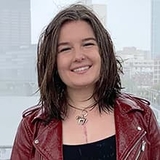
Erin, 25
Diagnosis: Tetralogy of Fallot with pulmonary atresia
Q: What helped you the most when you were going through treatment for your cardiac condition?
A: Leaning on my friends, my boyfriend, my animals and my family helped me. I also found support in the CHOP team — everyone at CHOP wants to make your experience as easy as possible and will help with anything they can. Plus, CHOP “room service” food has AMAZING star-shaped tater tots which got me through every morning during my admission.
Q: What is your life like now?
A: I try to keep my life filled with people and things that bring me joy, like my family, my crew of friends and my amazing boyfriend. I graduated from college in 2018, and I’m heading back to school this year for my master’s in public health. Currently, I work at CHOP as a clinical research coordinator in the Cancer Center. When I’m not working, you can probably catch me at the barn riding my horse, Peddler!
Q: What’s the most important piece of advice you have for other kids who are currently in the midst of treatment for a cardiac condition?
A: For a long time, I really struggled with my procedural and surgical scars. I like to remind myself that scars are tattoos with better stories. Although our hearts will always have a huge impact on our lives, they do not need to determine our fates and what we do with our futures.
Q: Why do you think it’s important to share your success story?
A: Having a congenital heart defect can be extremely isolating. As a CHD community, it is essential for older patients to help provide support, reassure and lift up “newer” members. As scary as it all can be, it’s always easier with a whole group of people cheering you on.
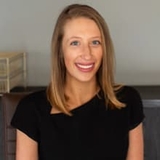
Bonnie, 30
Diagnosis: Transposition of the great arteries
Q: What helped you the most when you were going through treatment for your cardiac condition?
A: It helped to be empowered to know what was going on with my body by both my treatment providers and my parents. There were no conversations outside my presence, and I was also encouraged to ask questions from a young age. I even remember one of my doctors drawing many examples for me to understand what was going on.
Q: What is your life like now?
A: I have a husband and two kids. I received prenatal treatment through the Penn Maternal Fetal Medicine/CHOP partnership, which I can't speak of highly enough. Professionally, I founded a real estate law firm serving New Jersey and Pennsylvania.
Q: What’s the most important piece of advice you have for other kids who are currently in the midst of treatment for a cardiac condition?
A: Educate yourself (or your kids) about your condition. You'd be surprised by how many adults don't know what their condition is called, or how critical it is to remain in care for life.
Q: Why do you think it’s important to share your success story?
A: I want to inspire kids to know that this path I have found myself on — having kids, pursuing entrepreneurship — is possible with continued adult care. It wasn't so long ago that people like me would have been unable to contribute uniquely to their community through owning a business.
Read more about Bonnie's story.

Disha, 37
Diagnosis: Double outlet right ventricle
Q: What helped you the most when you were going through treatment for your cardiac condition?
A: I used some of the activities from the Cardiac Center, such as bracelet-making kits and DVDs, to keep my mind busy and relaxed. I also had lengthy chats with my family, friends and loving nurses about anything other than my surgery.
Q: What is your life like now?
A: I am married and a mother to two boys. I taught preschool before my boys were born. Now, I enjoy reading books, traveling, painting and spending time with my family.
Q: What’s the most important piece of advice you have for other kids who are currently in the midst of treatment for a cardiac condition?
A: I know it can be scary at times, but it’s important to stay positive. Think about what makes you happy and find something you can do in the hospital to keep your mind busy. Also, don’t be afraid to talk about your feelings with family, friends or the nurses. I found talking really helps!
Q: Why do you think it’s important to share your success story?
A: When I was younger, I did not know anyone with a congenital heart defect. Not knowing anyone else’s story made me nervous about my future. It's important to remember that even though there may be a few bumps along the way, there are many happy stories to come.
Read more about Disha's story.
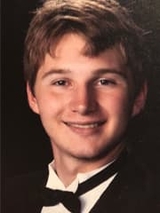
Brady, 18
Diagnosis: Bicuspid aortic valve
Q: What helped you the most when you were going through treatment for your cardiac condition?
A: Sleep helped me recover physically and mentally. It also helped to know I was in the best hands possible.
Q: What is your life like now?
A: I like to hang out with friends, play video games and run and do yoga for exercise. I also attend college online.
Q: What’s the most important piece of advice you have for other kids who are currently in the midst of treatment for a cardiac condition?
A: The most important thing is to always be grateful for technology and the people around you who are devoted to helping you get better. Whether it be your nurses, doctors, parents, friends or others, they are putting in time and effort for you.
Q: Why do you think it’s important to share your success story?
A: This kind of experience is scary at any age, and while everyone processes things differently, it’s always helpful to see others who have gone through the same thing in their own lives.